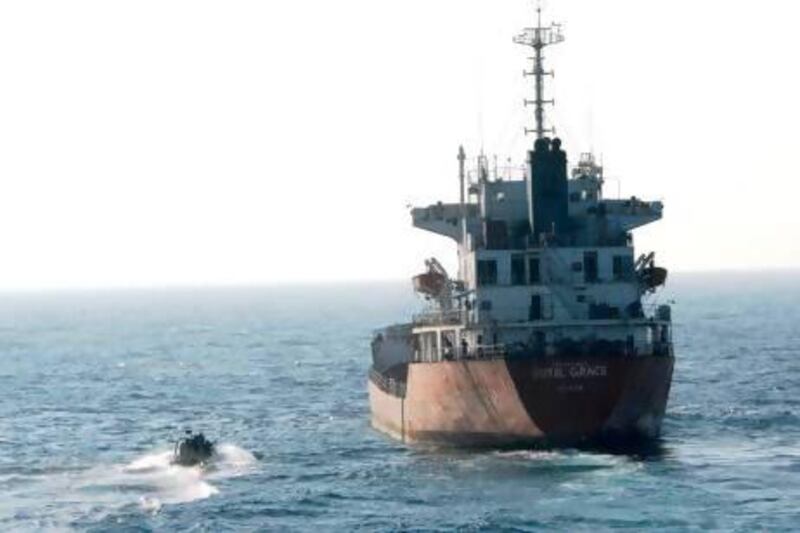DUBAI // Somali pirates have released a UAE-owned cargo vessel and its crew in return for an undisclosed ransom a year after hijacking the ship off the coast of Oman.
The chemical tanker MV Royal Grace was spotted on Friday morning by the European Union Naval Force flagship Mendez Nunez, which was conducting counter-piracy patrols 20 nautical miles off the northern Somali coast.
The tanker skipper confirmed by radio that the pirates had gone and that his crew required food, water and medical aid. A team from the Mendez Nunez went on board and provided medical treatment for two crew.
"I am relieved that the crew of MV Royal Grace are now safe and on their way home," said Rear Admiral Bob Tarrant, operation commander of the EU Naval Force. "It has been an extremely worrying time for the men and their families."
The tanker was hijacked on March 2 last year in the Gulf of Oman while on its way to Nigeria. It was not carrying cargo. The pirates demanded Dh6.2 million to free the captain and crew of about 20, who come from India, Nigeria, Pakistan and Bangladesh.
Last night the tanker was on its way to Salalah in Oman, escorted by another EU Naval Force vessel, the Rayo. The convoy is moving slowly and it is not known when it will arrive in Oman.
One of the crew, Mithun, called his sister Seeja in New Delhi to say: "After all our suffering, we are free. I will tell you everything when we meet."
Seeja described her family's joy on hearing from her brother, for whom sailing with the Royal Grace was a second job.
"I was frozen when my brother called; then I cried a lot," she said.
"He said they are all safe, but two men are sick and are being treated. There are no words to describe our relief."
Other relatives had begun celebrating.
"We are going mad with happiness," said Sushil Kumar, the brother of freed sailor Saurav, 24, a senior deck cadet on his first job.
"We couldn't believe it when we got the call and no one believed us because officially there was no news. He called home to say that they are sailing away from Somalia and a doctor was on board to check them.
"We are eagerly waiting to see him. We are distributing sweets in happiness and there is a lot of noise and celebration."
Relatives had been planning to begin a hunger strike in New Delhi on Monday before they heard the crew had been released.
They had repeatedly approached the Indian prime minister, Manmoham Singh, and shipping, foreign and external affairs ministries for more information about the hostages. More than a dozen relatives staged sit-in protests last year in front of the shipping ministry demanding answers.
The protests began after relatives began receiving phone calls from the pirates in September last year warning that the hostages would be killed if ransom was not paid.
"Now all is settled and we just have to wait to see the boys," Mr Kumar said.
The Panama-registered tanker Royal Grace is part of the fleet of Oyster Cargo and Shipping in Dubai, which is owned by a Nigerian businessman.
Ship owners and the owners of hijacked cargo usually pay ransoms through insurance policies.
In 2011, Somali pirates netted Dh588 million and cost the world economy about Dh25 billion, according to the United States think tank the One Earth Future foundation.
But the number of successful pirate attacks has since fallen dramatically as international navies have stepped up patrols to protect marine traffic and struck at pirate bases on the Somali coast, prompted by soaring shipping costs, including insurance.
Shipping firms have also increasingly deployed armed guards and laid out razor wire on their vessels to deter attacks.
The Somali president Hassan Sheikh Mohamud granted an amnesty in February to hundreds of young Somali pirates in a attempt to draw them away from gangs responsible for hijackings and reduce the threat to shipping.
rtalwar@thenational.ae
* Additional reporting by Reuters
Somali pirates free crew of UAE tanker Royal Grace after gruelling 12 months
The UAE tanker Royal Grace, its captain and 20-man crew have been released by Somali pirates a year after being captured.

Editor's picks
More from the national






